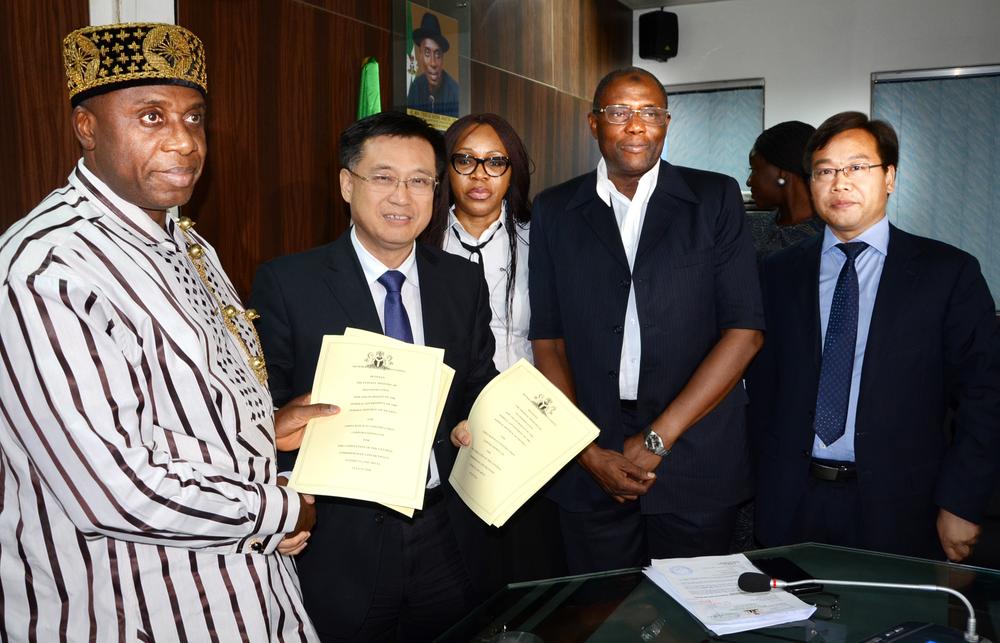

The federal government on Thursday signed an
agreement with the China Railway Construction Corporation (CRCC) to construct
the $3.9 billion Abuja-Baru-Itakpe-Warri rail line; build a new seaport and
mange same for a period of 30 years.
The contract was signed by both parties at the
headquarters of the Federal Ministry of Transportation in Abuja, where the
Minister of Transportation, Rotimi Amaechi, noted that with the latest $3.9
billion contract, the Chinese firm has now been saddled with handling all rail
projects in Nigeria.
The minister said: “The signing ceremony that we
had today (yesterday) is the first Public-Private Partnership (PPP) railway
agreement for Abuja-Itakpe or Abuja-Baru-Itakpe-Lokoja rail line, and it is between Nigeria and CRCC.
“The agreement is supposed to be 15 per cent
Nigeria equity and 10 per cent CRCC equity, and then we borrow 75 per cent as Special
Purpose Vehicle (SPV) from the Chinese bank.
“There is a
concession agreement that CRCC will hold 75 per cent, since the entire Nigerian
railway lines are constructed by CRCC."
He explained that the good working relationship Nigeria
has with the company was the reason other companies have not been engaged by
the Nigerian Government.
According to him, the PPP agreement was better than
going to borrow huge sum of money required for the construction of the new phase
of the rail line, adding: “If we raise our equity, they will raise theirs too.
But largely, the funds will come from China."
The minister noted that the rail line is one of the
longest in Nigeria now, stressing that besides the narrow gauge, the
Itakpe-Warri Rail line, which constructed by Julius Berger, got close to
completion before it was later abandoned.
He stated that "some of them were vandalised,
and then we had to re-award it to CCECC to complete the vandalised areas;
complete the project and build a new seaport as well as operate and manage them
for 30 years to enable the company recover their money."
Amaechi also called for the localisation of railway
technology, noting that from the history of China railway construction, China
localised the American technology.
The first American company that started railway
construction in China was General Electric (GE), he said.
He revealed that it was imperative to instruct both
CCECC and CRCC to realise the need for local participation of both Nigerian
engineers and contractors.
"We need you to work with us to develop the
knowledge of Nigerians, and that's why we are emphasising on you to build
universities and provide us with lecturers until we can train our own
lecturers.
"Just like we are holding CCECC on the issue
of manufacturing at Kajola, for which we have awarded them the contract of
about $500 million to build rolling stock for the Lagos-Ibadan rail line, we
will also resume talk with CRCC on the issue of manufacturing railway
components in Nigeria," Amaechi said.
On his part, the Vice President of CRCC, Wang
Wenzhong, while appreciating the support of the minister and the ministry on
behalf of the 300,000 staff of CRCC, congratulated him on his reappointment.
Wenzhong stated that CRCC is the biggest construction company of China and the
biggest railway company globally
He said: "In 2018, we occupy 55 among the top
500 enterprises around the world. Now we have businesses and projects in 127
countries all over the world with a turnover of $110billion."
"We pay lots of attention to the development
of Nigeria. We also make use of our best resources in Nigeria. We are also going
to provide our resources to the development of Nigeria. We demand our
subsidiaries to work hard for Nigeria, as we want all our projects in the country
to be the best in terms of quality, and for the satisfaction of the people of
Nigeria.
“We have some mega projects like the Lagos-Ibadan
railway which has great importance in the development of Nigeria. We also made
a lot of efforts for the financing of Ibadan to Kano rail project especially
with some financial institutions of China.
“We hope that the Nigerian Government will take this
project as the most prioritised one and also provide some counterpart funds so
that when financing is settled, we will be able to start the project early next
year.”
No comments:
Post a Comment